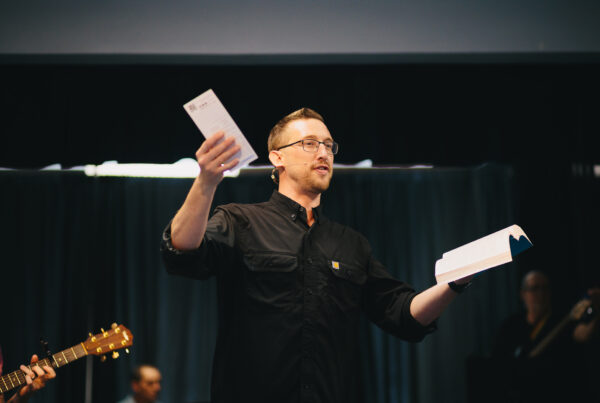Being a pastor is like death by a thousand paper cuts… You’re scrutinized and criticized from top to bottom, stem to stern. You work for an invisible, perfect Boss, and you’re supposed to lead a ragtag gaggle of volunteers towards God’s coming future. It’s like herding cats, but harder.
-Forbes Magazine Article from February 2014;
Ranking The 9 Toughest Leadership Roles
Being a church-planting pastor has been the most exhilarating ministry adventure that I’ve ever been blessed to be a part of. And yet, at the same time, in many ways it’s been a bloody and brutal season of pain. And this is the mysteriously odd (and at times maddening) paradox of being a church planter.
Now, don’t get me wrong, I’m seriously not complaining. Or perhaps I am complaining a bit. But not about ministry in general! What I mean is this: I’m not complaining about the fact that, at times, planting a church has been difficult, arduous, and has even caused me to become more frustrated than an Amish electrician. I get it! Ministry can be exceedingly difficult and that’s always been the case (See Uncle “Charlie” Spurgeon’s book, Lectures to My Students! Specifically chapter eleven!).
What I am saying is this: In some ways I feel like being a church planter has been far more difficult than anyone ever told me it was going to be. You see… I foolishly thought I was well prepared for this thing. After spending a few years as an itinerant preacher, and then a combined ten years as a Student Pastor on both the West Coast and the East Coast, I was absolutely convinced that I was ready to plant a church. And then, following my Acts 29 assessment in 2009, where I was assessed and approved by some really solid dudes who were already in this gauntlet called “church planting”, I became more convinced than ever! I had read all the Stetzer books, submitted myself to a quality assessment from a top-notch global church-planting network, and now I was ready to charge hell with a squirt gun and a manly roar!
All that to say, when I first stepped out to plant Emmaus Church here in the suburbs of Atlanta, I was like most every other church planter I had ever met; arrogant, cocky, and obnoxiously loud. Much like Kanye West with an ESV bible.
But now here I sit in my office chair on a damp Monday morning, almost seven years after our very first Core Group gathering in my living room. I sit here emotionally exhausted and mentally numb from all that occurred on this church campus just yesterday. The “post-adrenaline blues” that every preacher knows so well has officially kicked down the door to my heart this morning, causing me to pause and lose myself in a moment of deep and sublime reflection. And in this moment I can see this thing going one of two ways.
Option One: I can put on Pearl Jam’s “Vs.” album and stare out the window for an hour, sipping a cup of French Roast, willing myself to return ten old emails.
Or….
Option Two: I can prayerfully surrender this moment over to King Jesus. And, following His lead, I can choose to make the most of this moment and allow Him to use it for His purposes.
So…in an effort to allow Christ to have complete lordship over this moment in time, I want to offer a gift to any of you men out there who may be currently praying about whether or not King Jesus is calling you to be a church planter. I want to offer a gift to any of you ESV Bible-equipped-Kanye West-church planters in the world who are preparing to surrender the rest of your years to the roller coaster mission field of being a planting pastor. I want to offer you a gift that I so wish someone would have offered to me seven years ago, in the days just before my wife and I stepped out to plant Emmaus Church.
So….here goes….
Here are 10 things I for every planter before your first core group gathering.
1. Plant the kind of church that you would want to be a part of even if you weren’t the lead pastor. But don’t be discouraged when you’re still not that church 3 years in!
I’ll never forget year 3 of our church plant. We had just been forced to make an abrupt facility move (taking us from a musty gym that smelled like sweaty socks to a movie theater at a local mall). The crazy thing is this move was actually a huge downgrade for our church!
Overnight we went from being a church family that had free reign over an entire gym for the whole day on Sundays (allowing us to hang out before and after services to develop a deep and rich sense of gospel community) to being a church in a busy movie theater where we were only allowed a brief two hour window to set up, “do church”, tear down, and then get the heck out. I still remember closing out the sermon with a prayer one Sunday only to have my prayer interrupted by the sound of the Coming Attractions preview blaring over the loud speaker!
Three years into our church plant, as a result of this “sharp left turn”, community suffered, the church shrank, people left or became incredibly inconsistent, and I strongly considered sending out my resume’ to anyone who might take it.
I can still remember the Sunday I looked at my wife, Heather, while we were driving home after church and I said these words: “Heather, sometimes I don’t know why these people still show up. I wouldn’t come to this church if I wasn’t the pastor here”. Thankfully, my wife, who tends to be the voice of reason in our family, just looked at me with a tender smile and said: “Well, sweetie, you are the pastor here”.
Eugene Peterson once described the process of discipleship as “a long obedience in the same direction”. Today I firmly believe the same description applies to planting a church.
Gentlemen, plant the kind of church you know King Jesus has called you to plant. Plant the kind of church you would want to be a covenant member of even if you weren’t the pastor there. But be patient. It’s a long (and sometimes even painful) obedience in the same direction.
Just remember this: Jesus knows what He’s doing. You often don’t.
Just remember this: Jesus knows what He’s doing. You often don’t.
2. Don’t take it personally when people leave.
Here’s the stark reality of being a church planter. People you love will eventually leave. People you thought you would grow old with in this church will eventually leave. The very people you never dreamed would leave will eventually leave. Sometimes they will communicate with you why they are leaving. More times than not, they won’t. They’ll just leave. And their silence will at times be deafening.
As Lead Pastor, the question you must always ask when a person or a family leaves the church is this: Are they leaving because of some unresolved sin that I am guilty of?
If the answer to that question is yes, then you should set the example and humbly repent. If the answer to that question is no, then you should let God be God and entrust those people to His loving care. Sleep like a Calvinist.
Let’s be honest, the temptation for us when someone leaves (especially in the context of a smaller church plant) is to take it personally. Our insecurities are laid bare at this moment! “Perhaps they left because I am terribly deficient in my leadership, or my preaching, or my personality, or my character, or in everything!” If you are anything like me (a sinful scumbag even on my best days) then when people leave, it will reveal your idolatrous tendency to be “a pleaser of man”.
Thankfully, Jesus is The Senior Pastor of your church. Trust that He’s Sovereign… even when people leave your church!
So… allow me to take the pressure off of you for a moment, Mr. Insecure Church Planter. Don’t worry! You’re actually much worse than you think! You are deficient in every way! You are fallen. You are totally depraved. You are a sinner. And Jesus is your Champion. Thankfully He is The Senior Pastor of your church. Trust that He’s Sovereign… even when people leave your church. Rejoice that those people are saved (if they are). Focus on the lost and dying in your community who deeply need the Gospel! That is why God has planted you there. The Great Commission is your mission!
3. Don’t take it personally when people show up.
As much as it stings whenever people you love leave the church you plant, it feels quite delightful when new people and new families actually show up! What church planter doesn’t like a room packed to critical mass, parking lot problems due to the sheer volume of SUV’s, and running out of bulletins on a Sunday morning? Of course we love that! It’s part of the reason we planted a church in the first place! No man plants a church because he dreams of preaching the gospel to empty rooms and passionately inviting the vacant chairs to live on mission.
Your personality, no matter how charismatic and winsome, did not draw those people to the church; the Holy Spirit did that.
But when the people show up (and most likely they will), there is something crucial you must remember. Those people don’t belong to you; those people belong to Jesus. Your personality, no matter how charismatic and winsome, did not draw those people there; the Holy Spirit did that. And the greatest hope those people have for true and lasting life-transformation is found in the gospel. It’s not found in how awesome of a leader you are.
As the Apostle Paul tells us in 1st Corinthians chapter 3, we can plant seeds and we can water seeds, but ultimately it is The LORD’s job to cause that seed to actually grow and become something beautiful. So when people begin to eventually show up, don’t take that personally. They aren’t there because you are awesome. They’re there because God is good.
4. It’s better to walk slowly at a healthy pace than to sprint at an unhealthy pace.
My wife is a runner. She’s completed three half-marathons and more 5k’s and 10k’s than I can possibly count. I only run when being chased by a rabid animal that has sharp teeth.
But in the church planting game, my tendency to sprint is constant. Especially in the early days of planting Emmaus Church… The pace I was running at was ridiculous! Perhaps it’s my neurotic “daddy issues” (which we all have), or maybe it was my idolatrous desire to use ministry as an arena to “prove myself”. Whatever it was, I was foolishly ignoring what actually matters most.
Soon after planting this church I slowly began to replace foundational spiritual disciplines like silence, solitude, focused prayer, and meditation on God’s Word with just being “busy”. I said yes to every person who wanted to meet (because, lets be honest, I was just glad someone was actually interested in our dysfunctional new church and wanted to meet), I stayed glued to my iPhone around-the-clock so that no email would ever fall through the cracks, and I pretty much answered every single phone call at the exact moment it came in (Because I honestly wanted folks to have their minds blown by the instant access they could have with this new church plant’s pastor! Where else could you get that kind of service? I mean, wow!!).
But there was just one enormous problem with the way that I was operating. It was totally unsustainable. Maybe I could pull that kind of pace off for a few months, but there was no way I’d be able to maintain it for the long haul. And if I tried to maintain that unhealthy (and incredibly unwise) pace, I would either eventually crash head on into a nervous break down or I would cause my wife and daughters to hate the church with a fury because it always seemed to come before quality time with them.
Jesus once asked the question, “What does it profit a man to gain the whole world and yet forfeit his soul?”
I want to ask you a question much like that, Mr. Church Planter: “What does it profit a church planter to gain a huge church, lots of Twitter followers, and invitations to speak at Catalyst Conference, and yet forfeit his soul?”
5. Allow criticism to be your Coach, not your Kryptonite.
Dear Church Planter,
You will be criticized. Welcome to leadership.
Church Planter, allow criticism to be your Coach, not your Kryptonite.
Your decisions will be second-guessed. Additionally, some really tough calls, that only you as the Lead Pastor can make, will be scrutinized by people (but not actually to your face). Your preaching will be critiqued as being too long, or too short, or too pragmatic, or too theological, or too Reformed, or not Reformed enough, or too expositional, or not expositional enough, or too biblical (that one’s my favorite!). You will often not be given the benefit of the doubt, and a whole lot of assumptions will even be made about you by people who won’t have the courage to just come and talk with you one-on-one. And the best part is (that’s sarcasm by the way) that much of this criticism will come directly from people who, themselves, have never had to experience the pressure of actually leading anything.
Again, welcome to ministry. This happened to Moses. This happened to Paul. This happened to Jesus. And this will happen to you because no servant is greater than his Master.
The question is simply this: When you are criticized, how will you respond?
Mr. Church Planter, I am pleading with you to allow criticism to be your Coach and not your Kryptonite. The difference between those two responses to criticism is vast.
When you allow the criticisms of others to be your Coach, you ask yourself questions like this: Is any of this critique true? If so, what can I learn from this? If not, how can I love and pray for this person who is criticizing something they obviously don’t understand? How can I be careful to actually learn from this experience and not criticize others myself when I don’t fully understand the scope of their decisions?
On the other hand, when you allow the criticisms of others to be your Kryptonite, you begin to grapple with questions that come out of your own personal sinful insecurities. You begin to ask questions like this: Why doesn’t this person like me? What’s his/her problem? How can I point out their own imperfections so that they get a taste of what it feels like to be criticized?
Kryptonite sucks the life out of you. Coaches breathe life in to you.
Charles Spurgeon once said that every minister needs to have “one blind eye and one deaf ear” when it comes to criticisms from people within the church. His point is simple: Don’t take every criticism too seriously. But don’t immediately roll your eyes at every criticism either. That’s pride and it always comes before a fall.
6. You are not God’s gift to the pulpit. The gospel is!
When we first planted Emmaus Church, I was the one in the pulpit all the time. Because let’s be honest… there wasn’t anyone else! I was the primary preacher partly because I was the only preacher. One morning during year two, I even dragged myself out of bed with the stomach bug and preached a sermon out of The Gospel of Mark, all the while praying that I wouldn’t blow chunks and cause the church to shrink by 50% in a matter of three seconds. But I had to. There was no other option.
But then God began to grow our church exponentially. We began to hire staff. An Associate Pastor came on board…. then a Worship Pastor…. then a Church Planting Resident… then a Discipleship & Groups Pastor… and yet still, I felt the pressure to always be in the pulpit.
But this time it was a sinful pressure that I was putting upon myself. I was actually beginning to believe that this church depended upon my preaching. I was an idiot. I was ignoring my own health (allowing myself regular reprieves from the intense demands of sermon preparation & delivery) while also ignoring the intentional development of these other men on staff (allowing them to have regular reps in the pulpit in an effort to sharpen their preaching gifts).
You are not God’s gift to the pulpit. The gospel is.
Don’t make the same mistake that I did, Mr. Church Planter. Listen to the Apostle Paul’s mandate to his intern, Titus in Titus 1:5. Appoint men to serve as elders in your church who are qualified to teach the glorious truths of gospel. And then let them pinch hit for you regularly.
You are not God’s gift to the pulpit. The gospel is.
7. Don’t allow “the elephant in the room” to rule the church. Allow King Jesus to do that.
I used to believe that the most difficult transition a church planter ever had to make was to eventually transition from “church planter mode” to “pastor/shepherd mode”. To be sure, this is a real mind-shift and it requires lots of prayer and intentionality. I was wrong though. That is not the most difficult transition a church planter eventually has to make. It’s something different altogether.
One day as your church plant begins to grow into a sustainable church (by God’s grace), and especially as you begin to hire more staff, there will be a transition you’ll be forced to make, and it will be much like learning to drive a stick shift; lots of rough hiccups and embarrassing grinding of gears. What I’m referring to is the transition from operating exclusively as a Preaching Pastor and beginning to also operate as an Executive Pastor who sometimes has to make really hard calls regarding staff.
You see, as you begin to oversee more and more staff, and until you have someone on board who can actually operate as the “XP”, you are accountable for leading this team. And often times that means dealing with difficult “elephants in the room”.
You see, since people are people, and since sin is sin, and since spiritual warfare is real, sometimes you will be forced to have difficult conversations with the staff you are charged to lead. You are a “boss” and therefore you must operate like a boss.
When a staff member has a bad attitude that’s affecting the rest of the team, what are you going to do? When a staff member isn’t doing his/her job effectively, what are you going to do? When a staff member is refusing to be a team player and instead seems to be on a mission to build his/her own kingdom, how are you going to respond? Will you allow that “elephant in the room” to rule the church? Or instead, will you refuse to allow an elephant to hijack the mission of Jesus?
God has called you to lead that church that He has called you to plant. Leaders don’t ignore elephants. As a man of God you should be loving, and humble, and biblical, and helpful, but by all means be firm and clear. If you’re afraid to have a difficult conversation, then you honestly probably shouldn’t be a leader. Go find another job where someone else deals with the elephants.
Leaders don’t put up with elephants.
8. You must evolve as the church grows. No. Seriously. You must!
I love Acts chapter 6. I always have.
In Acts chapter 6 the apostles are faced with a huge dilemma. The church is growing by leaps and bounds and the twelve apostles are forced to change the way they have been operating up to this point. They used to be able to “do it all”. Feed widows, deliver groceries to local orphanages, lead the small groups ministry, clean the sanctuary, counsel the young 20 year old Calvinist, study for the sermon, preach the sermon, disciple the new believer, count the offering, make the deposit, and lead the men’s bible study. All in a day’s work!
But now, with the church growing dramatically, they are forced to evolve. Someone else must be appointed to oversee and lead the other important tasks. In order for this growing church to remain faithful to the mission of Jesus, the apostles must now focus primarily on “the ministry of the word and prayer” while other qualified people do the other stuff.
The same thing is true for you, Mr. Church Planter. You must evolve.
In the early days of our plant, when we were a church of 38 people (on a large Sunday) sitting on an indoor Astroturf field in rows of cheap chairs in a local gym, I could pretty much do it all. Everyone had my cell number. I would counsel anyone (even though I really stink at counseling). I did every wedding, I made every hospital visit, I wrote and sent out every all-church email, I attended (and even led) every membership class, I had coffee with every new visitor, I answered every email promptly, and I even vacuumed every square-inch of the Astroturf.
Today, Emmaus Church is a church of almost 600 people with 3 Sunday services. If I gave out my cell number to everyone, counseled everyone, made every hospital visit, did every pastoral counseling session, did every wedding, wrote every all-church email, made an appearance at every training meeting, and had coffee with every new visitor to our church, then pretty soon somebody would be counseling me or visiting me in the hospital. That’s just not realistic.
In every growing church, the Lead Pastor must eventually evolve. You cannot continue to operate the way you did when you first planted. If you do, the church will cease to be biblically faithful. As your church grows, you will need to make the healthy shift from the philosophy of “I’ll do whatever it takes” to the far more wise philosophy of “I will only do what only I can do”.
You must.
9. Take good care of your wife and kids. They’re in it for the long haul.
My wife, Heather, is my best friend. She’s been my best friend since we were in the eleventh grade. We were High School sweethearts. During the time we’ve been together, we’ve been to four proms and two Homecoming dances, we’ve gone to college formals, we got engaged on top of a mountain, we’ve lived on both coasts, we’ve parasailed and snorkeled together in Hawaii, we’ve walked hand-in-hand over the Golden Gate Bridge, we’ve struggled through infertility and cried many tears, we’ve miraculously had two daughters, and we’ve planted a church together. Like I said, my wife is my best friend.
Sometimes I’ll come home after a really emotionally, spiritually, and physically draining day at the church and my wife is always there to love me. My daughters are always there too. And their first question to me is never “Daddy, what impressive thing did you accomplish today at the church?”. In fact, that’s not even their tenth question to me. They’re just there to love me. They’re just there to be loved by me.
As I continue to journey down this road of pastoring a local church, one truth is becoming more and more clear to me. My wife and two daughters are in this thing for the long haul. They have sacrificed so much over the years as a church-planting family. And they have always done so with joy. I want to care for them the way that I should. Before God has called me to pastor Emmaus Church, He has called me to pastor Heather, Annabelle, and Madeline.
Take good care of your family, Pastor. They were the very first members of your church.
Mr. Church Planter, be a faithful pastor to your family. Care for them. Sometimes that looks like reading the bible and praying together as a family, but that’s not all it is. Sometimes it means getting away. Sometimes it means taking a week off, getting out of town, and leaving the Grudem books behind so you can reconnect on a heart-level with your family. Study them for a week. Or two.
Take good care of your family, Pastor. They were the very first members of your church.
10. Your health matters…. so take Sabbath seriously.
About two years ago, I suddenly developed a random head tic. Seemingly out of nowhere, I began to have an involuntary issue with my head (Believe me, it’s as weird as it sounds). Our elders noticed it and told me to get out of town for a few days with my family so I could get some rest. I did that. And one night during this brief family getaway, while we were at a seafood restaurant having a nice meal, I passed out face down into my plate of fried grouper. It was terrifying.
After numerous consults with different heart doctors and Neurologists, their diagnosis was that my cortisol levels were through the roof. I had run at such a crazy pace for such a long period of time that I was now having adrenaline issues. Even though my body would be at rest, my mind wouldn’t shut off, and my body was continuing to produce unhealthy amounts of adrenaline.
Planting a church was becoming hazardous to my health.
I remember the moment when one of the Neurologists I was seeing literally said to me, “Anson…. My father is a church planter, so I know how you guys are. You have to slow down.”
Not protecting my sabbath was my futile attempt to be more productive than my Heavenly Father.
During this trying season of my life, one of the things that the Holy Spirit convicted me of big-time is how I had basically become a theological cessationist when it came to the biblical principle of Sabbath. I believed in Sabbath. I knew Sabbath was important. I just didn’t actually practice Sabbath or guard my own Sabbath. Think of the arrogance of this way of living! I was refusing to rest my body and mind even though the God of all creation found it necessary to do so in Genesis chapter 2. It was my futile attempt to be more productive than my Heavenly Father. And it led me right into a brain doctor’s office.
Mr. Church Planter, don’t make the same mistake that I did. Guard your Sabbath. Protect your Sabbath. If you don’t, I promise, no one else will. Turn off your phone. Ignore your social media. Shut down your computer. Put away your sermon notes. Take a walk outside. Feel the sun on your face. Talk to King Jesus about small things. Enjoy Him for Him. Stop doing. God created you to be a “human being”, not a “human doing”. Just be. Just rest. The work is His. Let’s do it His way.
And there it is, Mr. Church Planter. There are the 10 things I deeply wish someone had told me on the day before our very first Core Group gathering seven years ago. I hope this helps you. Allow me to pay a bit of your “dumb-tax” for you.
Now go and exhaust the one life you have for King Jesus in this glorious movement called church planting. At times it will be hard. But it will always be worth it.











